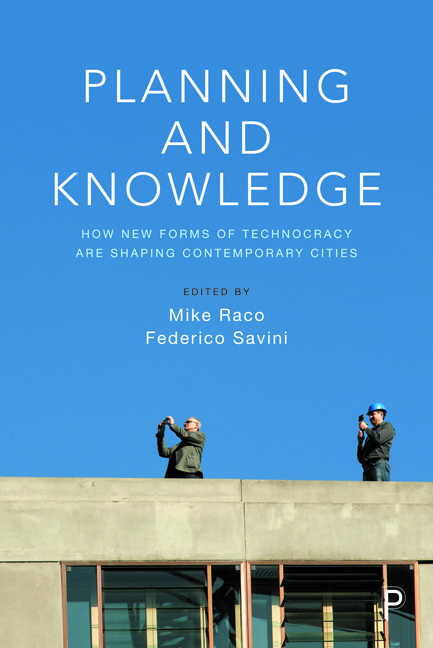Book contents
- Frontmatter
- Contents
- List of figures
- List of tables
- Notes on contributors
- Part I Conceptual framings of technocracy
- Part II Public planning and bureaucracies in contemporary urban development politics
- Part III Corporate knowledge and the land and property development sector
- Part IV Private consultants and the delivery of public policy
- Part V New constellations of actors and the management and governance of contemporary cities
- References
- Index
1 - The rise of a new urban technocracy
Published online by Cambridge University Press: 30 April 2022
- Frontmatter
- Contents
- List of figures
- List of tables
- Notes on contributors
- Part I Conceptual framings of technocracy
- Part II Public planning and bureaucracies in contemporary urban development politics
- Part III Corporate knowledge and the land and property development sector
- Part IV Private consultants and the delivery of public policy
- Part V New constellations of actors and the management and governance of contemporary cities
- References
- Index
Summary
The complex landscape of experts in urbandevelopment
In cities and countries across the Global Northterritorial planning systems are coming undergrowing pressure and facing demands for structuralreform. The financial crisis of 2008 widened anddeepened existing neoliberal trends that questionedthe raison d’être of state planning and itsdeployment as a governmental mechanism fororganising and managing urban spaces and places. Inan era of anaemic growth and growing welfaredemands, there is a restless search amongpolicymakers and development agencies to uncovermore entrepreneurial governance models andmechanisms that will convert messy urban places intospaces for investment and accumulation (Moore et al,2017). Much of the focus of reform has been inlooking for ways to use planning policies to promoteparticular forms of expertiseand technocratic knowledge that willfacilitate growth while minimising political‘interference’ and disruptions (see Dikeç andSwyngedouw, 2017). Even within national contextsthat are still characterised by highlybureaucratised forms of government intervention,there have been shifts towards more entrepreneurialaction, so that the promotion of growth is having astronger influence on the organisational, regulatoryand political instruments employed in public policy(Le Galès and Vitale, 2013; Penny, 2017).
It is in this wider context that this book and itscollection of essays is set. Contributions drawingon a range of examples, from a number of countries,critically reflect on the degree to which we arewitnessing the rise of a newtechnocracy in urban governance. Ourobjective is to enhance understandings of therelationships between public action, staterestructuring and what we term emergent markets ofexpertise. The shift to a new technocracy, we argue,is leading to the re-fashioning of planning's coreobjectives and purpose from an earlier focus on thevalue of input-centredforms of deliberation, place-making and socialjustice to an enhanced concern with output-centred agendaspremised on expedited development and growth(compare Scharpf, 1999). The rolling out ofentrepreneurial planning requires the employment ofnew governance technologies, such as quantitativesystems of managerialism and the implementation of amultiplicity of codifications and models that areused to define urban problems and their solutions.As later chapters will show, restructuring processeshave affected all aspects of planning practice andpolicymaking, from its underlying financialinfrastructures to its symbolic and politicalcharacter.
- Type
- Chapter
- Information
- Planning and KnowledgeHow New Forms of Technocracy Are Shaping Contemporary Cities, pp. 3 - 18Publisher: Bristol University PressPrint publication year: 2019
- 3
- Cited by

